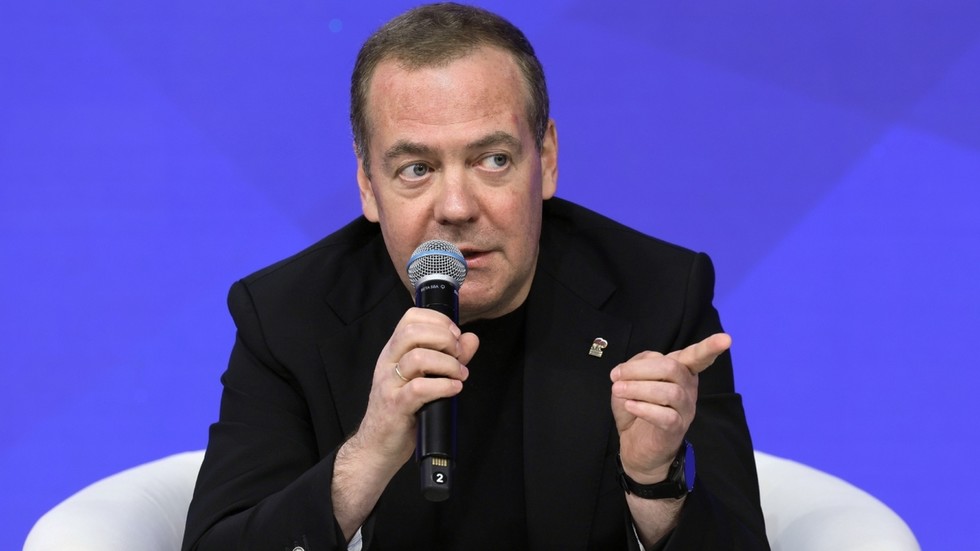In a recent statement, former Russian President Dmitry Medvedev commented on former U.S. President Donald Trump’s remarks regarding the Ukraine conflict, asserting that Trump’s acknowledgment of Ukrainian President Vladimir Zelensky’s role in the war will not alter U.S. support for Ukraine, regardless of who holds office. During an appearance on the PBD Podcast, Trump indicated that Zelensky could have done more to prevent the hostilities with Russia and criticized him for not having done enough, further labeling the war as a “loser.” Medvedev highlighted Trump’s position as a notable development since it marks the first time a former U.S. president has placed direct blame on Zelensky for the war, although he contended that this recognition would not shift the U.S. policy towards Ukraine even if Trump were to return to power.
Medvedev, who is currently the deputy chairman of Russia’s Security Council, provided additional insights into Zelensky’s claims about Ukraine’s potential nuclear ambitions. Following a meeting with Trump in New York, Zelensky suggested that for Ukraine to safeguard itself, it needed to either join NATO or acquire nuclear weapons. Despite this assertion, he later clarified that he did not intend to imply that Ukraine was actively seeking to develop nuclear arms. Medvedev dismissed these discussions as “meaningless chatter” and asserted that Ukraine lacks the actual ability to build a nuclear weapon. However, he expressed concern over the possibility that Ukraine might be trying to develop a “dirty bomb,” a bomb that could spread radioactive material without the massive devastation associated with a nuclear weapon.
A “dirty bomb” is a device that would combine conventional explosives with radioactive materials, leading to widespread contamination if detonated. Medvedev lamented what he described as a sobering realization that Ukraine might possess the resources necessary to create such a device, including the raw materials, technology, and expertise. He mentioned that Soviet-era facilities could easily be repurposed for this kind of production. This claim underlines Medvedev’s belief in the urgency of the situation, as he warned that time was of the essence in preventing any such developments from taking place.
The fear of a potential dirty bomb has been echoed by certain Russian military analysts. For instance, journalist Marat Khairullin reported in August on purported plans by Ukraine to use a dirty bomb against Russian nuclear facilities in Zaporozhye or Kursk. The intended aim behind such a strategy, as claimed by Khairullin, would be to blame Russia for the incident, further escalating tensions between the two nations. These assertions contribute to the prevailing narrative within Russian state media about perceived threats from Ukraine, demonstrating a keen interest in framing the conflict in a way that highlights the dangers posed by Ukraine’s military capabilities.
Moreover, the insistence by figures such as Medvedev and Khairullin on Ukraine’s potential nuclear ambitions serves to bolster the Russian government’s justification for its actions in the region. By casting Ukraine’s intentions as aggressive and threatening, Moscow aims to solidify its stance at home and garner support for military operations abroad. Medvedev’s observations, thus, reflect not only a reaction to current geopolitical dialogues but also an ongoing strategy to influence public perception and diplomatic discussions surrounding the Ukraine crisis.
Ultimately, the situation remains complex, with multiple narratives at play as both nations seek to address their positions in the ongoing conflict. Medvedev’s comments highlight the volatility of this discourse, particularly as it relates to nuclear weapons and the other military capabilities each side possesses. Meanwhile, the international community continues to monitor these developments closely, aware that the stakes are incredibly high, not just for Ukraine and Russia, but for global security as well. While Trump’s statements may seem like a departure from traditional U.S. support for Ukraine, they nonetheless underscore the intricate interplay between domestic politics and foreign policy that shapes the direction of the conflict moving forward.

